On May 2, 2025, the Department of Homeland Security (DHS) issued Delegation 15006, a pivotal directive expanding the U.S. Citizenship and Immigration Services (USCIS) authority—once restricted to adjudicating benefits like green cards and naturalization—into full-fledged law enforcement powers previously reserved for ICE and CBP.
On September 4, 2025, USCIS confirmed plans to activate these new powers by establishing a cadre of special agents authorized to:
- Order expedited removals
- Issue and execute warrants and detainers
- Detain or release individuals on bond
- Conduct civil and criminal investigations
- Carry firearms and make arrests
The final rule codifying these powers will be published in the Federal Register on September 5, 2025, and will take effect 30 days later (October 5, 2025).
Background & Legal Foundations
- Under earlier delegation (DHS Delegation 0150.1, June 2003), USCIS lacked authority to enforce immigration laws—such as detainment, arrests, or removal—which were exclusively delegated to ICE and CBP.
- Delegation 15006 overruled that limitation, granting the USCIS Director authority to redelegate law enforcement powers—including expedited removal, issuing detainers and warrants, detaining individuals, and recommending prosecutions.
- USCIS has since been coordinating with ICE under a July 2025 Memorandum of Agreement (MOA), wherein USCIS handles civil fraud detections and ICE prosecutes criminal cases. Delegation 15006 disrupts this framework, enabling USCIS to engage directly in criminal enforcement functions.
Summary Table
| Aspect | Details |
|---|---|
| Delegation Issued | May 2, 2025: DHS issues Delegation 15006 to the USCIS Director |
| New Powers Include | Expedited removal, warrants, detainers, bonds, investigations, arrests, firearms |
| Final Rule Published | September 5, 2025 (Federal Register) |
| Effective Date | October 5, 2025 |
| Operational Impact | USCIS to recruit/train special agents; expand enforcement role into criminal and civil contexts |
| Legal Implication | USCIS gains parity with ICE/CBP in enforcement; may shift traditional roles |
| Concerns Raised | Potential chilling effect on applicants; blurred line between service and enforcement |
Impact: What This Means in Practice
- USCIS, traditionally a benefits-focused agency, will now act as both adjudicator and enforcer. Applicants seeking green cards, citizenship, or other benefits may face enforcement consequences—not just administrative outcomes—during interviews and application processes.
- The new special agents will enhance USCIS’s footprint in immigration enforcement, from investigations through to arrests and removals.
- Critics warn this shift may erode trust in the immigration system, potentially discouraging lawful applicants from fully engaging with USCIS processes.

